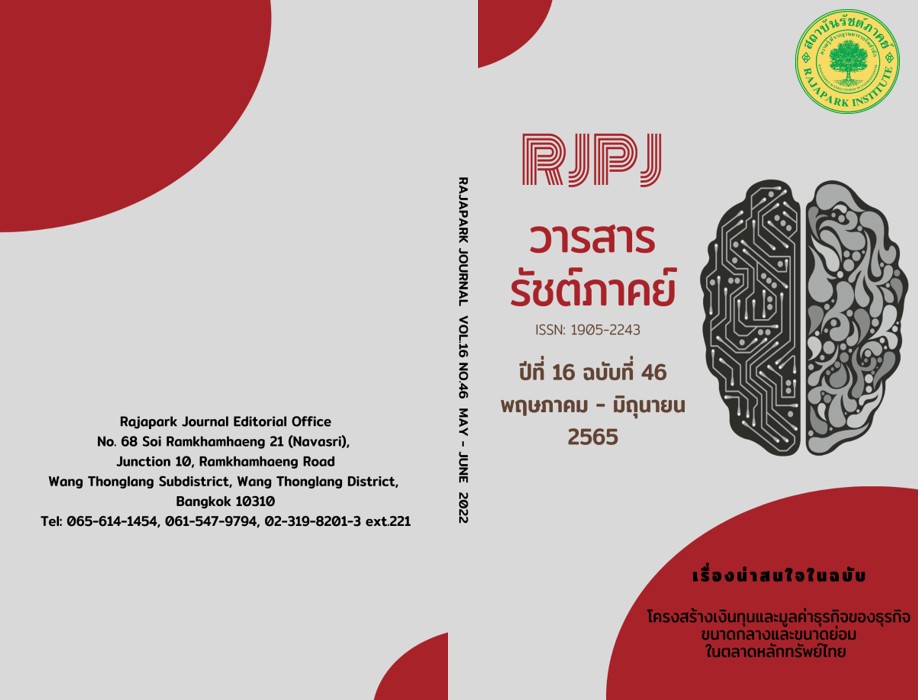Creating A Customer Retention System for A Traditional Restaurant Business for The Success of The Organization
Main Article Content
Abstract
The purpose of this research was to study the causal factors of Service marketing mix of information technology and social marketing That affects the retention of customers. To study the causal factors of Service marketing mix information technology and social marketing that affect the modern business operation of the traditional restaurant business for the success of the organization. and to model the customer retention system of the traditional restaurant business for corporate success. The participants were 544 people who were Restaurant business operators in Thailand by stratified sampling. The research instrument was a questionnaire. The statistics used to analyze the data were mean, standard deviation, and using the Structural Equation Model with Partial Least Squares technique for testing hypotheses. The findings revealed that service marketing mix factor information technology factor Social Media Marketing Factors That affect the retention of customers in the traditional restaurant business for the success of the organization the overall level is at a high level. In customer retention studies and modern business operations, the overall level is at a high level. and modeling on building customer retention systems of traditional restaurant businesses for corporate success found that the structural equation modeling model was appropriate to blend with the empirical data. The research highlights the importance of understanding the influence and causal relationship patterns of building a traditional restaurant customer retention system for corporate success.
Article Details

This work is licensed under a Creative Commons Attribution-NonCommercial-NoDerivatives 4.0 International License.
Views and opinions appearing in the Journal it is the responsibility of the author of the article, and does not constitute the view and responsibility of the editorial team.
References
Aaker, D. A. (2004). Leveraging the Corporate Brand. California Management Review, 46(3), 6-18. https://doi.org/10.1177/000812560404600301
Amofah, O., Gyamfi, I., & Osei Tutu, C. (2016). The Influence of Service Marketing Mix on Customer Choice of Repeat Purchase of Restaurant in Kumasi, Ghana. European Journal of Business and Management, 8(11), 102-112.
Atsawamongkonpan, N., & Sampanwattanachai, B. (2018) Marketing Through Social Networks Affecting the Decision to Purchase Organic Cosmetics of Consumers in Bangkok. Dusit Thani College Journal, 12(3), 397-413.
Chandi, C. (2011). Factors Relating to Product Buying Behavior of Consumer Through Social Media. [Master’s Thesis, Srinakharinwirot University].
Chatsawvapan, B. (2017). Social Media Marketing Communication Strategies for Television Programs[Master’s Thesis, National Institute of Development Administration].
Chung, K.H., & Pruitt, S. W. (1994) A Simple Approximation of Tobin’s q. Financial Management, 23, 70-74. https://doi.org/10.2307/3665623
Department of Business Development. (2019). Statistics on the Number of Restaurant Businesses in Thailand in 2019. http://www.dbd.go.th/download/documentfile/Statisic/2560/T26/ T26_201703.pdf
Department of Business Development. (2020). Business Data Warehouse System. http://datawarehouse.dbd.go.th/bdw/search/search2.html
Douglas, C.M. (2007). Design and Analysis of Experiments (6th ed.). John Willey & Sons.
Duhé, S. C. (2017). New Media and Public Relations (3rd ed.). Peter Lang.
Hayes, E. B. (2014). Customer Loyalty is Alive and Well. https://businessoverbroadway.com/2014/04/01/customer-loyalty-is-alive-and-well/
Hsu, Chin-Chun., & Pereira, A. (2008). Internationalization and performance: The moderating effects of organizational learning: Knowledge Management and Organizational Learning. Omega (Oxford), 36(2), 188-205.
Jyh-Fu Jeng, D., & Bailey, T. (2012). Assessing Customer Retention Strategies in Mobile Telecommunications: Hybrid MCDM Approach. Management Decision, 50(9), 1570-1595. https://doi.org/10.1108/00251741211266697
Kaplan, R. S., & Norton, D. P. (2004). Measuring the Strategic Readiness of Intangible Assets. Harvard Business Review, 82(2), 52-63.
Kotler, P., & Keller, K. L. (2009). Marketing Management (13th ed.). Pearson Education.
Kraisarin, K. (2012). Services Marketing Mix Affecting Consumers Towards Selecting Restaurants in Mueang Ratchaburi District[Master’s Thesis, Chiang Mai University].
Li, F., Larimo, J., & Leonidas C. (2021). Social Media Marketing Strategy: Definition, Conceptualization, Taxonomy, Validation, and Future Agenda. Journal of the Academy of Marketing Science, 49(1), 51–70.
Miller, D., & Friesen, P. H. (1982) Innovation in Conservative and Entrepreneurial Firms: Two Models of Strategic Momentum. Strategic Management Journal, 3, 1-25. https://doi.org/10.1002/smj.4250030102
Ministry of Science and Technology. (2017). Report on the results of a study on domain name registration policy for Thailand. Ministry of Science and Technology.
Nyuesude, M. (2013). The Use of Information Technology and Communication to Develop an Information Technology System for Use within the Organisation by Suan Dusit Rajabhat University Personnel. Faculty of Communication Arts, Dhurakij Pundit University.
Osathanukul, R. (2013). Factors Affecting Consumption Behavior of Consumers using Restaurant Services on Huay Kaew Road Muang District, Chiang Mai Province. Chiang Mai University.
Phantongkodchakorn, C. (2016). Digital Marketing Communication for Online Fitness Membership Service and Factors Affecting Consumers’ Decisions: A Case Study of Guavapass Thailand[Master’s Thesis, Bangkok University].
Ratnitipong, T. (2011). Factors Affecting Street-Food Consumption Behavior of Working-Age Consumers on Silom Road[Master’s Thesis, Srinakharinwirot University].
Saikatikorn, S. (2015). The Development of Modern Information Technology Marketing; To Promote Local Communities, Hua Hin, Prachuap Khiri Khan Province. Rajamangala University of Technology Rattanakosin.
Smith, J. (2008). Information Technology’s Influence on Productivity[Master’s Thesis, TheUniversity of Nebraska].
Songsom, A., & Trichun, C. (2013). Structural Equation Model of Customer Loyalty: Case Study of Traditional Retail Shop Customers in Hat Yai District, Songkhla Province, Thailand. Journal of Management Research, 5(1), 128-137.
Thatsanawong, P. (2011). Information Technology Systems Analysis and Design: A Managerial Perspective. Faculty of Science, Silpakorn University.
Vanichbuncha, K. (2019). Statistics for Research (12th ed.). Chulalongkorn University.
Weerasamrit, W. (2010). Corporate Social Responsibility Influencing the Loyalty of Advance info Service Public Company’s Customers[Master’s Thesis, Srinakharinwirot University].
Wichitchote, P. (2016). Application of Information Technology, A Case Study of Implementation of GLPI Program for Employees in VALEO Group[Master’s Thesis, Burapha University].
Wu, Shwu-Ing., & Lu, Chien-Lung. (2012). The Relationship Between CRM, RM, and Business Performance: A study of the Hotel Industry in Taiwan. International Journal of Hospitality Management, 31(1), 276–285. doi:10.1016/j.ijhm.2011.06.012


